With 30 years of experience, the chief economist of BBVA Mexico, Carlos Serrano (Mexico City, 1970), glimpses chiaroscuro on the country's economic horizon.
After the shock caused by the pandemic for all productive sectors, the ITAM economist, with experience in the International Monetary Fund and the World Bank, envisions a window of opportunity for Mexico hand in hand with the relocation of companies or nearshoring
.
However, as a specialist in international economics, banking and macroeconomics, he also warns that maintaining a restrictive policy with high interest rates and the latent risk of a next recession in the United States could curb these expectations of economic growth that last year reached the 3.1%
Faced with these storm clouds, Serrano emphasizes the need for the economic policy of the Government of López Obrador to provide more certainty of the rule of law to investors, as well as a rethinking of energy policy that until now favors the state company, the Commission Federal Electricity (CFE).
Question:
The inflation data in Mexico in February stood at 7.62%, a decrease compared to January. Is it the beginning of a definitive downward trend?
Answer
: We believe that we are already on a downward trend in inflation.
Inflation already reached its peak in Mexico last August and September.
It is true that it had a very slight rebound in January, but that small rebound has not marked a change in trend.
It seems to me that inflation continues to decline and will continue to decline this year.
No, it will not be an easy path, it is possible that we will see some fortnights where there are small setbacks, but the trend we anticipate is that inflation will continue to fall to settle at 4.7% at the end of the year.
Q.
What are the factors that support your downward forecast?
A.
There is a lot of evidence that inflation in the United States is declining as well.
Much of the inflationary period in Mexico is due, above all, to external factors.
We are a very open economy and it was impossible to think that we were going to see very high inflation in the world without this being translated into inflation in the country.
So, I think that as inflation in the US goes down, it will also go down in Mexico.
In addition, we already have a very restrictive monetary policy, I think it should start to drop soon, but listening to the tone of the statements from Banco México, it seems to me that they may not start to drop until next year.
Although I personally think that we already have a very high interest rate that, in part, will also cause prices to go down.
Q.
_
How much has the Pacic plan, implemented by this government, helped to stop the escalation of prices?
A.
It has not had a significant effect.
Some of these policies are positive, for example, the reduction of tariffs, facilitating customs procedures, but these measures have effects in the medium term and I believe that what we are seeing now is more the result of the disinflationary process in the United States and that merchandise bottlenecks have been resolved
Q.
The federal government argues that if it had not subsidized gasoline, inflation would be in double digits...
R.
Yes, inflation would have been higher, not now, because gasoline and oil have gone down not much, but I think that if it hadn't been for this, instead of reaching this peak of 8.7% we probably would have reached one or two points more, something above 10%.
That does not mean, from my point of view, that it was a good policy. Why?
Because it is a regressive social policy.
Gasoline favors people with higher incomes, that is very clear.
Subsidizing gasoline does not contribute to policies against climate change either, I think it is not a good public policy.
Carlos Serrano, Chief Economist at BBVA Bancomer in Mexico.Hector Guerrero
Q.
Do you anticipate that the Bank of Mexico will continue raising the interest rate?
R.
It will depend fundamentally on the Federal Reserve, because the Bank of Mexico has said that it wants to maintain a wide rate differential with respect to the Fed. It seems to me that now it is feasible that two more increases of 25 basis points will come and in that sense we could reach 11.50% or 11.75% and I think that would be the terminal rate of this cycle of increases.
Q.
How much will an interest rate of 11.75% affect the Mexican economy?
R.
_
It is already beginning to affect and would affect even more, especially credit to companies, because at these rates there are projects that do not become viable.
We are seeing some weakness in the demand for credit by companies, in addition to negative effects on the consumption of durable goods and on automotive credit.
Q.
Although prices are rising, consumption continues to grow. Why?
R.
Consumption is very resilient and that is something positive.
We are seeing a stage of significant wage growth.
Last year real wages in Mexico grew around 2% because the labor market is relatively strong.
We have low unemployment rates.
Last year 753,000 formal jobs were created and that creates pressure on wages and the other is increases in the minimum wage.
In the country, the minimum wage had fallen behind enormously in real terms and I think that this year consumption will continue to be relatively strong because wages will continue to rise.
The other reason why consumption has been resilient is because of remittances.
Remittances are a very important source for consumption in Mexico, especially for lower-income families in certain states and remittances had growth of 15%,
Q.
Do you think that remittances to Mexico will continue to break records in 2023?
R.
Yes, I think they are going to break the record.
I think that they will not grow at the same rate as last year, because eventually the labor market in the United States will suffer the effect of high rates.
So, last year they grew 15% and this year we forecast that they could grow between 7% and 9%.
So they will not grow at the same rate, but they will be above 60,000 million dollars.
Q.
Do you see a risk of recession in the United States?
A.
Yes, we see it due to the increase in interest rates.
There is much discussion about whether there is a recession in the US or not, but there is a consensus that it will slow down.
And if the United States slows down, Mexico too, and that is why I think that this year Mexico can grow a little less than last year, because we will not have that engine of the economy.
Q.
What is your economic growth forecast for this year?
A.
Our growth forecast this year is 1.4% because we believe that there could be this small recession in the United States.
If it manages to avoid recession, Mexico could grow up to 2%.
Q.
Even so, with these possible risks, the Mexican currency remains strong against the dollar. How do you explain the recent strength of the peso?
R.
There are several factors, one is the fiscal situation in Mexico.
The country today has a fiscal situation that compares favorably with the average of advanced countries, we have a debt as a percentage of GDP that is relatively low, below 50%, and that compares very well with the vast majority of emerging countries that have a higher debt.
For example, Brazil, a country with which we compete for flow, is above 80%.
The second factor is that Mexico is a country that does not have external imbalances.
We have a very small current account deficit.
The third reason is the monetary policy of high interest rates.
Q.
The Government has attributed the strong parity of the Mexican peso as an achievement of its administration.
R.
The fact that there is a good macroeconomic anchoring gives stability and that is positive.
But you also have to be cautious and say that a very strong peso is not necessarily something positive for the economy, because it can have negative effects for the export sector and the tourism sector.
We believe that by the end of the year, the exchange rate will be at 18.50 or 19 units per dollar.
Q.
Now that there is more and more talk about the famous
nearshoring
, do you notice more interest and appetite from companies to relocate to Mexico?
R.
Yes, very strong,
nearshoring
is already a reality.
Investment in imported machinery, equipment and capital goods has been growing at significant rates since the end of 2021. We are also seeing that occupancy in industrial buildings in the north of the country is at historically high levels, with occupancies of close to 99%
.
The announcement of the arrival of Tesla in Nuevo León is an example, and an announcement as big as this one can attract more investment.
It is a reality that companies are reducing their exposure to China and Mexico has the possibility of attracting a large part of that investment, especially in electronics, cars and auto parts and metal mechanics.
Mexico is the country in the world that has benefited the most from
nearshoring processes
for having a modern free trade agreement that few countries have, for already having highly integrated value chains and for having a trained workforce that is already inserted in these value chains.
Now, I think that Mexico could be the most benefited, but it is not yet.
Q.
What is missing?
R.
A shift in energy policy.
The companies that are relocating require a guarantee that they will have access to energy, sufficient electricity, at competitive prices and non-polluting, and the energy policy that is currently being followed wants to give more priority to the state company, which has capacity problems, which it is more expensive than private generators and more polluting for producing with fuel and combined cycle techniques.
The second thing that I think Mexico should do is strengthen the rule of law and send out the signal that Mexico is a country where contracts are respected and the rules are not going to be changed arbitrarily and I think there have been some decisions of policies that have gone in the opposite direction, such as the cancellation of a brewery plant and the cancellation of the Mexico City airport.
Q.
What is your balance of the economic policy of the Government of López Obrador?
R.
There are successes, there has been macroeconomic stability, there has been a prudent fiscal policy, respect for the autonomy of Banco de México.
It has also been a success that wages have increased and that
outsourcing
has been combated , and this will result in more permanent jobs, greater access to credit, that is positive.
I think there are some that could be improved.
One is energy policy and the other is that some uncertainty has been generated for investment with these policy signals and I believe that without them there could be a higher level of investment and therefore greater growth and that could even allow spending more powerful social
Carlos Serrano at the BBVA Bancomer offices in Mexico City.Hector Guerrero
subscribe here
to the
EL PAÍS México
newsletter and receive all the key information on current affairs in this country












/cloudfront-eu-central-1.images.arcpublishing.com/prisa/KMEYMJKESBAZBE4MRBAM4TGHIQ.jpg)


